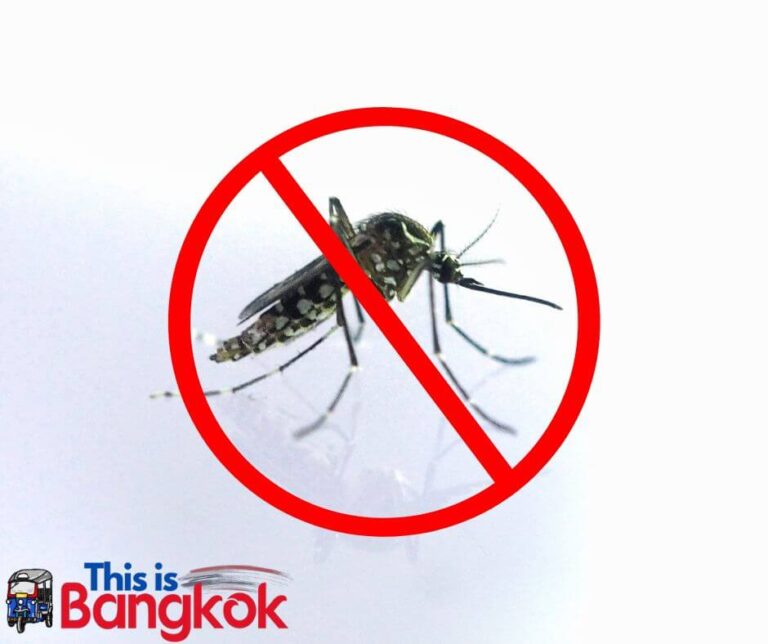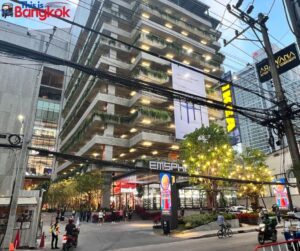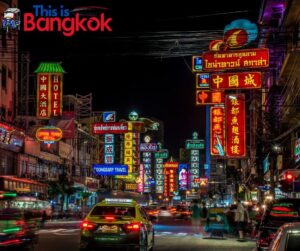Bangkok, the vibrant capital city of Thailand, is known for its stunning temples, bustling markets, and flavorful street food.
However, a pressing question often arises for many travelers: “Are there mosquitoes in Bangkok?” –
This query is particularly crucial for those who wish to enjoy the city’s outdoor attractions while staying safe and comfortable.
In this post, we’ll delve into the presence of mosquitoes in Bangkok and provide some valuable tips for dealing with these pesky insects.

Are there many mosquitos in Bangkok?
Yes, there are mosquitoes in Bangkok, Thailand.
Like many other tropical and subtropical regions, Bangkok has a warm and humid climate provides a suitable environment for mosquitoes to thrive.
Mosquitoes are prevalent in the city, especially during the rainy season, typically from May to October.
It’s essential to take precautions against mosquito bites, such as using insect repellent, wearing long sleeves and pants, and staying in accommodations with proper mosquito screening.
Are mosquitos a problem in Bangkok?
Yes, mosquitoes can be a problem in Bangkok, especially during the rainy season when their populations tend to increase.
Bangkok’s warm and humid climate provides an ideal breeding environment for mosquitoes. While not all mosquitoes carry diseases, some species can transmit illnesses like Dengue Fever.
Local authorities and residents often take measures to control mosquito populations and minimize the risk of disease transmission.
This includes fogging, draining stagnant water, and public health campaigns to raise awareness about mosquito-borne diseases and prevention methods.
Tourists and residents should still take precautions to protect themselves from mosquito bites, such as using insect repellent, wearing appropriate clothing, and staying in accommodations with proper mosquito screening.
While mosquitoes are a concern in Bangkok, the risk of mosquito-borne diseases can be significantly reduced with proper precautions and awareness.
Do I need insect repellent in Bangkok?
It’s a good idea to use insect repellent when visiting Bangkok, especially if you plan to spend time outdoors, particularly during the rainy season (May to October) when mosquito populations are higher.
Using insect repellent can help protect you from mosquito bites and reduce the risk of mosquito-borne diseases such as dengue fever, Zika virus, and chikungunya.
When choosing an insect repellent, look for products that contain active ingredients like DEET, picaridin, or oil of lemon eucalyptus.
These ingredients are effective at repelling mosquitoes. Be sure to follow the instructions on the repellent’s packaging for proper application.
In addition to using insect repellent, you can also take other precautions to minimize your exposure to mosquitoes:
- Wear long-sleeved clothing and pants, especially during the early morning and late afternoon when mosquitoes are most active.
- Stay in accommodations that have proper mosquito screening on windows and doors.
- Avoid areas with stagnant water, as these are breeding grounds for mosquitoes.
Taking these precautions will help you have a more comfortable and worry-free experience while exploring Bangkok.
Can you get bitten in Thailand?
Like in many other tropical and subtropical regions, you can get bitten by mosquitoes in Thailand.
Mosquitoes are common in Thailand and can be active in urban areas and more rural or natural settings.
It’s essential to avoid mosquito bites in Thailand, as mosquitoes can transmit diseases such as dengue fever, Zika virus, and chikungunya.
Using insect repellent, wearing protective clothing, and staying in accommodations with proper mosquito screening are recommended measures to reduce the risk of mosquito bites and the potential transmission of diseases.
While mosquito bites are possible, preventive actions can significantly minimize your chances of being bitten and experiencing related health concerns.
Is malaria a problem in Bangkok?
Malaria is not considered a significant problem in Bangkok or the urban areas of Thailand.
The risk of contracting malaria in Bangkok is generally low, especially in well-developed urban areas where mosquito control measures are implemented.
Malaria is more prevalent in certain rural and border areas of Thailand, particularly in forested regions along the borders with neighboring countries.
If you plan to travel to these areas, taking appropriate precautions, such as taking antimalarial medication and using mosquito repellent and protective clothing, is essential.
In Bangkok and other urban areas, the primary concern for mosquito-borne diseases is often dengue fever, transmitted by the Aedes mosquito.
Dengue fever is more common in urban environments and can be a concern, particularly during the rainy season when mosquito populations are higher.
It’s always a good idea to check with travel advisories and healthcare professionals before traveling to any destination to understand the specific health risks and recommended preventive measures.
Do I need malaria pills for Bangkok?
Malaria pills are generally not required for travelers visiting Bangkok, as the risk of contracting malaria in the city’s urban areas is shallow.
Malaria is more of a concern in rural and border areas of Thailand, especially in regions where mosquito control may be less effective.
However, suppose you plan to travel to rural or forested areas outside of Bangkok, especially along the borders city’s urban areas and neighboring countries.
In that case, you might want to consult a healthcare professional or travel medicine specialist. They can provide you with up-to-date information on malaria risk in specific areas and recommend whether you should take antimalarial medication.
The primary concern for urban areas like Bangkok is usually mosquito-borne diseases like dengue fever and chikungunya, transmitted by the Aedes mosquito.
To protect yourself from these diseases, it’s important to use insect repellent, wear long sleeves and pants, and stay in accommodations with proper mosquito screening.
Always consult with a healthcare provider before traveling to make informed decisions about necessary vaccinations or medications based on your health status and travel plans.
In conclusion
Like many other tropical and subtropical regions, mosquitoes are a concern in Bangkok. Taking precautions to reduce mosquito exposure is essential for all tourists and residents.
Using insect repellent, wearing protective clothing, avoiding areas with stagnant water, and staying in accommodations with proper mosquito screening can help minimize your risk of mosquito bites and the potential transmission of mosquito-borne diseases.
Malaria is not a significant problem in Bangkok and other urban areas of Thailand; however, the risk can increase in certain remote rural regions and along the borders with neighboring countries.
If you plan to travel to these areas, consult your healthcare provider or a travel medicine specialist for appropriate preventive measures such as antimalarial medications.
By taking the necessary precautions, you can have a worry-free experience while exploring the beautiful city of Bangkok and its surrounding areas. Enjoy your trip!












